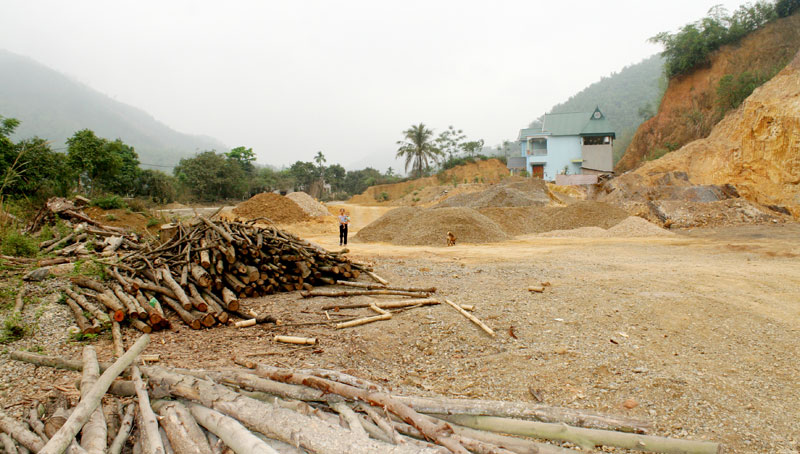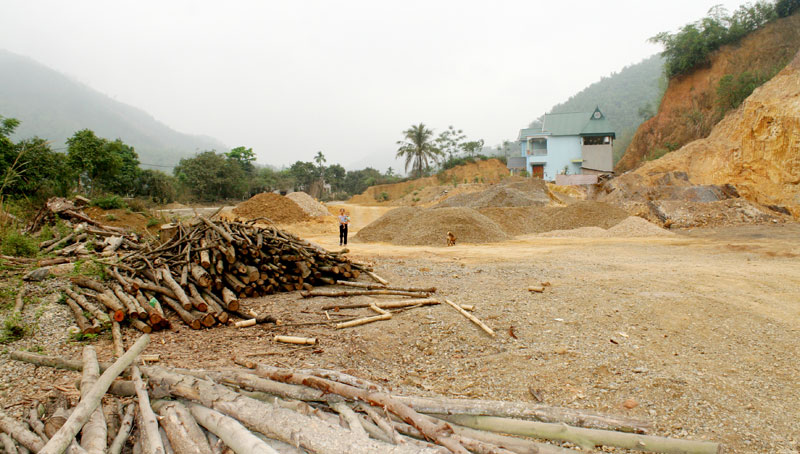
HBĐT) – the project of road No. 433 – directing Hoa Binh city to Da Bac district, is an important project of province. Over 6 years of deploying, the project have not yet been accomplished and the contract must be extended to December 2018. The reason that the project fell behind schedule is because of a lack of funds and entanglements in processing site clearance.

From km 1+670 to km 1+900, the length = 230
meters, there are four households addressing in May No. 4 hamlet, Hoa Binh
commune (Hoa Binh city). Although they had received full compensation of site
clearance and late payment interests, until now they have not yet handed over
the site for the construction teams.
The project of renovating and upgrading road
No. 433, particularly in a route from km 0 to km 23, was approved by People’s
Committee of Hoa Binh Province in Decision No. 2530/QĐ-UBND on 31stDecember 2010 and was allowed to adjust in Decision No.1161/QĐ-UBND on 27thAugust 2012 with the total length of route designing to 18,9 km, starting point
is km 0 at Huu Nghi ward (Hoa Binh city), and ending point is km 23+00 at Cao
Son commune (Da Bac district). The total amount of investment is 988 billion
VND ( including 691,3 billion VND for building; 35,9 billion VND for consulting
fees and others; 62 billion VND for the cost of site clearance and 199 billion
VND for contingencies). At the moment, the total capital is 578,5 billion VND
and has been disbursed completely.
Project Management Unit of Transport
Construction Works plans to perfect the ground, road surface and drainage
system on the route from km 0 to km 9+900 by 31st December 2018 in order to hand over for developing
and using. Now, the process of site clearance faces some difficulties and
entanglements which affect the construction progress.
Following the plan, the route from km 0 to km
9+900 has to be completed and come into operation in 2018. Project Management
Unit of Transport Construction Works proposed People’s Committee of Hoa Binh
Province to allocate for advancing budgetary resource, capital and other
equities with the total money of about 127,5 billion VND, aiding the
contractors building. In the process of site clearance, the relevant local
authorities are requested to focus on completing construction of resettlement
areas and finishing site clearance totally in order to hand over for
construction teams which will develop the rest parts as planning.
On 12th April of auditing date,
Chairman of the provincial People's Committee, Mr. Van Quang Nguyen, asserts
the Hoa Binh city and Da Bac district authorities to concentrate on resolving
site clearance conclusively, which
facilitates the contractors to organize
construction and strive for accomplishing project in December 2018.
According to data from the Hoa Binh Provincial Party Committee, the industrial production index for the first six months of 2025 is estimated to have increased by 20% compared to the same period last year. This marks the highest year-on-year growth rate for this period since 2020.
In the first six months of 2025, Hoa Binh province’s export turnover was estimated at 1.145 billion USD, marking an 18.11% increase compared to the same period in 2024. Import turnover was estimated at $ 804 million, a 17.15% increase, which helped the province maintain a positive trade balance.
The lives of the ethnic minority farmers in Tan Lac district have gradually improved thanks to the new directions in agricultural production. This is a testament to the collective strength fostered through the professional associations and groups implemented by various levels of the district’s Farmers’ Union.
With the motto the "product quality comes first,” after nearly one year of establishment and operation, Muong village’s Clean Food Agricultural and Commercial Cooperative, located in Cau Hamlet, Hung Son Commune (Kim Boi district), has launched reputable, high-quality agricultural products to the market that are well-received by consumers. The products such as Muong village’s pork sausage, salt-cured chicken, and salt-cured pork hocks have gradually carved out a place in the market and they are on the path to obtaining the OCOP certification.
In the past, the phrase "bumper harvest, rock-bottom prices" was a familiar refrain for Vietnamese farmers engaged in fragmented, small-scale agriculture. But today, a new spirit is emerging across rural areas of Hoa Binh province - one of collaboration, organisation, and collective economic models that provide a stable foundation for production.
Maintaining growing area codes and packing facility codes in accordance with regulations is a mandatory requirement for agricultural products to be eligible for export. Recently, the Department of Agriculture and Environment of Hoa Binh province has intensified technical supervision of designated farming areas and packing facilities to safeguard the "green passport" that enables its products to access international markets.



